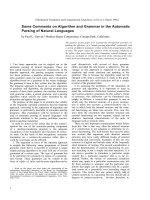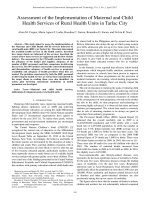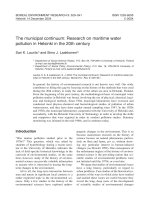Research on behavior and delay in seeking health services of tuberculosis patients at Namdinh province in 2013
Bạn đang xem bản rút gọn của tài liệu. Xem và tải ngay bản đầy đủ của tài liệu tại đây (967.69 KB, 5 trang )
Journal of military pharmaco-medicine no5-2018
RESEARCH ON BEHAVIORS AND DELAY IN SEEKING HEALTH
SERVICES OF TUBERCULOSIS PATIENT
AT NAM DINH PROVINCE IN 2013
Nguyen Dinh Tuan*; Nguyen Viet Nhung*; Le Van Bao**
SUMMARY
Objectives: To describe the knowledge, behaviors seeking health services and determine the
time from onset of symptoms until the tuberculosis disease was diagnosed. Subjects and
methods: Cross-sectional study by interviewing 341 tuberculosis patients, who registered
tuberculosis treatment in 4 districts of Nam Dinh province in 2013. Results: Patients lacked
knowledge about tuberculosis, only 57.8% of patients correctly understood the cause of the
disease, 36.1% of patients agreed to vaccinate against tuberculosis for infants and 27.6%
agreed to go early examination when having signs of tuberculosis. Behavior seeking health care
services for the first time when tuberculosis patients with suggestive symptoms of tuberculosis
in the commune health station was 49.9% and in district general hospital was 58.7% and in
private health facilities was 31.7%. The time from the onset of symptoms until the diagnosed
tuberculosis was fairly long, an average of 1.2 months. The most common reason that patients
,
delay in detecting tuberculosis was that they didn t think they had tuberculosis with 74.2%, and
economic difficulties accounted for 17.5%. Conclusion: Patient lacked knowledge about
tuberculosis, behaviors seeking health services of tuberculosis patients mainly in primary health
facilities, time from onset of symptoms until tuberculosis diagnosed fairly long.
* Keywords: Tuberculosis behaviors; Health services; Tuberculosis patient; Nam Dinh province.
INTRODUCTION
Vietnam still has a high burden of
tuberculosis (TB), ranks 16th out of 30
countries with the highest number of
tuberculosis patients in the world and
ranks 13th out of 30 countries with a
burden of multidrug-resistant TB [1].
Nowadays, private health services have
been developing, while people seeking
health care services in private health
facilities are on the rise. Several studies
have shown that private health facilities
lack of knowledge and practice about TB,
which has implications for the early
detection of tuberculosis [1]. Research on
behavior and delays in seeking medical
services of TB patients will help managers
with approciated intervention plans to
increase the early detection of TB.
Objectives of the study:
- Describe the knowledge, behavior of
seeking medical services of TB patients
- Determine the length of time from the
onset of TB symptoms to the diagnosis of
TB.
* Hochiminh University of Medicine and Pharmacy
**
***
Corresponding author: Nguyen Dinh Tuan ()
Date received: 08/03/2018
Date accepted: 23/05/2018
149
Journal of military pharmaco-medicine no5-2018
SUBJECTS AND METHODS
+ n: Minimum sample size.
1. Study subjects.
Tuberculosis patients registered for
treatment in four districts of Nam Dinh
province (Xuan Truong, Giao Thuy, Truc
Ninh, Nghia Hung).
+ Z(1- /2): Reliability, with probability
95%, Z(1- /2) = 1.96.
+ p: The rate of TB patients delayed in
detecting ≥ 30 days; p = 0.76.
+ q = 1- p = 0.24.
+ d: Tolerance at 5% (d = 0.05).
2. Methods.
A cross-sectional study by interviewing
TB patients by questionnaires.
* Sample size: Sample size of the
study description.
Inside:
Sample size was calculated (n = 281).
However, the sample size in the study
was all pulmonary TB patients registered
treatment in 4 studying districts in 2013.
The actual sample size in the study was
341 pulmonary TB patients.
* Data collection: interviews of all
pulmonary TB patients by questionnaires
at the time of the study.
RESULTS AND DISCUSSION
1. Characteristics of research subjects.
Table 1: Characteristics of age, gender of patients (n = 341).
Male
Female
Total
Age group
n
%
n
%
n
%
15 - 24
12
4.7
8
9.4
20
5.9
25 - 34
27
10.5
11
12.9
38
11.1
35 - 44
51
19.9
9
10.6
60
17.6
45 - 54
41
16.0
4
4.7
45
13.2
55 - 64
54
21.1
13
15.3
67
19.6
≥ 65
71
27.7
40
47.1
111
32.6
Total
256
75.1
85
24.9
341
100
The average age
52.8 ± 16.9
57.4 ± 22.4
54.0 ± 18.5
The average age of the TB patient was 54.0. The proportion of male was 75.1%,
which was 3.0 times higher than that of female (24.9%). The age and gender of TB
patients in the study matched with those of other studies and statistics 2013 of National
Tuberculosis Program [4, 2].
150
Journal of military pharmaco-medicine no5-2018
Table 2: Characteristics on the patient's education (n = 341).
Education
Quantity
%
Illiterate
14
4.1
Not graduated primary school
25
7.3
Graduated primary school
52
15.2
Graduated secondary school
159
46.6
Graduated high school
62
18.2
Graduated college, university
21
6.1
The education level of TB patients is generally low.
Table 3: Occupational characteristics of patients (n = 341).
Occupation
Quantity
%
Agriculture
248
72.7
Fishermen
3
0.9
Business
16
4.7
Workers and employees
9
2.6
Work for private sectors
12
3.5
Students
23
6.7
Housewife
12
3.5
Retirement
16
4.7
The main occupation of TB patients is farming, accounting for 72.7%, which is
suitable because the four study districts are agricultural districts.
2. Knowledge and behavior of seeking medical services of TB patients.
Table 4: Knowledge about the causes of tuberculosis and how to prevent it (n = 341).
Causes of tuberculosis
Quantity
%
Food - related
8
2.3
Genetic
40
11.7
Tuberculosis bacteria
197
57.8
Sick due to work hard
96
28.2
Get vaccination for newborns
123
36.1
No contact with TB patients
246
72.1
Early examination when signs of TB
94
27.6
Preventative measures
151
Journal of military pharmaco-medicine no5-2018
Only 57.8% of the respondents were
aware of the cause of TB disease. There
was a large percentage of patients with a
lack of knowledge about the cause of TB
(42.2%). The majority of patients lacked
knowledge about TB prevention, only
36.1% agreed to vaccinate newborns and
27.6% agreed to go to the clinic early.
hospital and provicial general hospital
were 6.7% and 2.3%, respectively. Therefore,
if there is good coordination with the
grassroots level, especially with the
participation of private facilities, it will help
increase the proportion of people having
access to TB examination services [5].
* Behavior of seeking medical services
of patients for the first time showing signs
of disease (n = 341):
The duration from the onset of TB
symptoms to TB patients diagnosed was
quite long with an average of 1.2 months,
of which the detection time < 30 days
accounted for 43.1%. Detection time ≥ 30
days accounted for 56.9%. This result is
consistent with the study by Vu Ngoc Bao,
D. Scott LaMontagne, Nguyen Viet Nhung
[3].
Most TB patients seek health services
at the grassroots level, 58.7% chose district
general hospitals, 49.9% chose commune
health stations and 31.7% selected private
health facilities (private practitioners/clinics/
pharmacies). Patients chose provicial lung
* Time delay for disease detection:
Table 5: Reasons for detection delay of tuberculosis.
Reasons for detection delay
Quantity
%
Do not think of TB
144
74.2
Economic difficulties
34
17.5
Home far away from the district hospital
8
4.1
Trouble when visiting the state health facilities
2
1.0
Do not know where to TB examination
2
1.0
The main reason of delayed detection
delay was that the patient did not think
they had TB with rate of 74.2%. The
reason of economic difficulties accounted
for 17.5%, home far away from the district
hospital was 4.1%, troubles in the state
health facilities and didn,t know where TB
clinic was low rate (1%). This result was
consistent with studies by Vu Ngoc Bao,
D. Scott LaMontagne, Nguyen Viet Nhung,
Le Thi Nga [3].
152
CONCLUSION
Patients lacked knowledge about
tuberculosis. The health service seeking
behavior of the patients was mainly at the
grassroots level. The time from onset of
symptoms until tuberculosis diagnosed
was fairly long (1.2 months). The most
basic reason for delaying the diagnosis
was that they didn’t think they had TB
(74.2%).
Journal of military pharmaco-medicine no5-2018
RECOMMENDATION
Strengthening communication activities
and health education on TB in the
community. Implementation of interventions
at the grassroots level, especially involving
private health facilities to enhance the
early detection of tuberculosis.
REFERENCES
1. Bộ Y tế - CTCLQG. Hướng dẫn phối
hợp giữa các cơ sở y tế trong quản lý bệnh
lao - Phần I (giới thiệu). Sách hướng dẫn.
Nhà xuất bản Y học. 2015, pp.19-23.
2. Trịnh Hữu Hùng. Nghiên cứu sự chậm
trễ tiếp cận dịch vụ y tế của bệnh nhân lao
phổi AFB (+) mới tại tỉnh Thanh Hóa và giải
pháp can thiệp. Luận án Tiến sỹ. Viện Vệ sinh
Dịch tễ Trung ương. 2008.
3. Vũ Ngọc Bảo, D.S.L, Nguyễn Viết Nhung,
Lê Thị Nga. Những rào cản đối với việc tiếp
cận và sử dụng dịch vụ chẩn đoán lao tại Việt
Nam. 2013.
4. Nguyễn Viết Nhung, N.B.H, Phạm
Huyền Khanh, Cornelia Hennig. Tuberculosis
case notification data in Viet Nam, 2007 to
2012. Surveillance report. 2015.
5. World Health Organization.
Tuberculosis Report 2017. 2017.
Global
6. N.B Hoa, E.W.T, D.N Sy, N.V Nhung, M
Vree, M.W Borgdorff, F.G.J Cobelens. Healthseeking behaviour among adults with
prolonged cough in Vietnam. Tropical
Medicine and International Health doi. 2011,
16 (10), pp.1260-1267.
153









